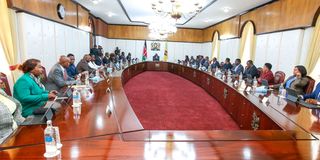Premium
Drama as MPs kick out Kenya power bosses in row over independent power producers

Kenya Power acting MD Geoffrey Wasua Muli (centre) when he appeared before the Public investment committee on Commercial affairs and energy at Parliament Buildings on March 2, 2023.
Expensive contracts with independent power producers (IPPs), blamed for runaway electricity costs, are the next stage for a showdown between MPs and President William Ruto’s government.
Yesterday, a National Assembly committee threw out Kenya Power bosses, accusing them of lacking tangible measures to reduce power costs, which lawmakers blamed on exorbitant deals with IPPs run by cartels shielded by the utility firm.
The development came two days after the Cabinet lifted the former President Uhuru Kenyatta-era ban on procurement of new IPPs, citing the need to increase power generation at a time cyclic drought is becoming more extreme, thus reducing hydropower generation.
A two-pronged onslaught against IPPs unfolded at the National Assembly’s Public Investment Committee on Commercial Affairs and Energy, and in the House where an MP allied to the ruling coalition has sponsored a motion to suspend the signing of new deals with IPPs.
The lawmakers are digging in to stop the signing of new power purchase agreements (PPAs) between Kenya Power and IPPs citing the high cost of electricity bought from the firms compared to that purchased from the state-owned KenGen.
An audit report by Auditor-General Nancy Gathungu indicates it costs Kenya Power an average of Sh5.3 per kWh of power purchased from KenGen while paying an average of Sh15.3 per kWh of power to the IPPs.
“It was noted that the effective unit cost of power purchased from some IPPs was as high as Sh195 per KWh and Sh118 per kWh while the same was sold at an average of Sh15.66 per KWh. The company, therefore, entered into very expensive contracts with IPPs and was in some instances selling power below the cost price,” Ms Gathungu says in her report.
Exorbitant contracts
A report by a task force on the review of PPAs in 2021 exposed the exorbitant contracts and informed Mr Kenyatta’s decision to temporarily freeze the procurement of new IPPs. Kenya Power has not signed any new deals in over a year.
On Tuesday, however, Cabinet lifted the ban on IPPs, citing the need to strike an “energy mix.”
“In addressing the challenges of realising sustainable energy mix occasioned by the prolonged drought, Cabinet approved the lifting of the moratorium on PPAs as a way of enhancing the nation’s energy security through opening up the energy sector for continued investments,” said a statement released after the Cabinet meeting.
But Cabinet, anticipating backlash, added a rider that it had “approved a framework for the transparent engagement of independent power producers in keeping with the renewable energy auction policy”.

Kenya Power acting MD Geoffrey Wasua Muli when he appeared before the Public investment committee on Commercial affairs and energy at Parliament Buildings on March 2, 2023.
Yesterday, the management of Kenya Power led by acting Managing Director Geoffrey Muli was ejected from the committee by lawmakers who vowed to unmask powerful cartels in the firm that are benefiting from costly deals with IPPs.
Mr Muli was accompanied by the acting general manager, corporate affairs and company secretary Awuor Owiti, general manager, of infrastructure development Aggrey Machasio and acting general manager, power planning and purchase John Ihuthia.
The committee chaired by Pokot South MP David Pkosing accused the utility firm of failing to enforce measures to lower the cost of power to attract investors and promote the growth of business in the country.
The lawmakers claimed that IPPs are comprised of cartels who over the years have held the utility hostage and are not interested in making electricity affordable to ordinary Kenyans.

President William Ruto chairs a Cabinet meeting at State House, Nairobi, on February 28, 2023. The Cabinet lifted the former President Uhuru Kenyatta-era ban on procurement of new IPPs, citing the need to increase power generation at a time cyclic drought is becoming more extreme, thus reducing hydropower generation.
“There might be beneficiaries of IPPs and we will unmask them soon. People of Kenya just want to pay what they are supposed to pay not being overcharged as is the case at the moment,” Mr Pkosing said. “These cartels are milking Kenyans by ensuring that the cost of power remains high.”.
No practical solutions
He said they took the decision to send away the Kenya Power bosses because they failed to offer practical solutions to the queries that Kenyans are asking over the high cost of power.
“The people of Kenya are being overcharged in terms of units of power they purchase. That is why we called you here to spell out measures being taken to ensure that power is affordable, but you have come here with unsatisfactory and generic answers. Go back and do your work properly,” Mr Pkosing told the managers.
Minority Leader Opiyo Wandayi called for a special audit of Kenya Power.
“This Kenya Power has been a milking cow for certain people in the energy sector both in the previous regime and the current one that has contributed to these massive losses. We must unmask them,” he said.
In yesterday’s meeting, the Kenya Power team was expected to answer questions on why payments in respect of power purchase showed that the capacity charge component of the energy paid to IPPs was always more than the charge for actual energy supplied as noted by the Auditor-General in her report.
The team was also expected to explain the loss variance of 2,899 gigawatt-hours (GWh) or 23.95 per cent of units of electricity it purchased.
Admitting that they have been making losses, Mr Muli said they have instituted a number of measures that have started bearing fruits. He said in the 2018/2019 financial year, they made a loss of Sh70 billion which increased to Sh75 billion in the 2019/2020 financial year. However, he said, the interventions saw the losses reduce to Sh66 billion in 2020/2021 and Sh56 billion in 2021/2022.
He further told MPs that Treasury owes them Sh19 billion, which, if released, would help them turn around the fortunes of the company.
In the National Assembly, Laikipia Woman Rep Jane Kagiri (UDA) has sponsored a motion to suspend the signing of new deals between Kenya Power and IPPs. Ms Kagiri says there is a need to regulate all IPPs in the country and publicise their locations, stakeholders, directors, management and agreements entered into with Kenya Power.
The lawmaker also wants the National Assembly’s Departmental Committee on Energy to undertake an inquiry into the operations of Kenya Power in relation to PPAs entered into with IPPs. This includes factors affecting the cost of electricity, including over-reliance on IPPs against available renewable and other energy sources, measures to reduce it and submitting a report to the House within 120 days.
The motion is set to be discussed on the floor of the House next week.
“In the meantime, the ministry (of Energy) and Kenya Power should not enter into new contracts with any IPPs until the House makes a resolution on the matter,” says Ms Kagiri in her motion.
Further, she wants the ministry to engage in negotiations with the IPPs to lower tariffs.






